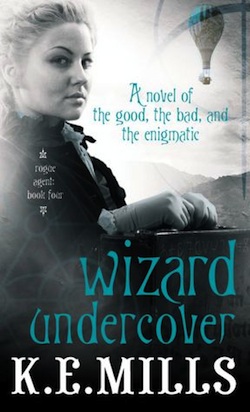“…Melissande’s declined the invitation. Something about the Crown Prince of Splotze and his wandering hands.”
“Oh,” said their mother, disappointed. “That’s terribly unobliging of her, I must say. As your friend she should be prepared for some trifling inconvenience if it means you could meet the right man.”
Wizard Undercover is the fourth book in the “Rogue Agent” series by K.E. Mills, an open pseudonym for Australian epic fantasy author Karen Miller. Miller’s other work includes the Godspeaker trilogy — whose first two volumes, Empress of Mijak and The Riven Kingdom, made the Tiptree honour list — as well as novels for the Stargate and Star Wars Expanded Universe franchises. The “Rogue Agent” series demonstrates her talent for combining humour and drama in a second-world fantasy setting.
And it’s really quite a talent.
Wizard Undercover follows on from 2010’s Wizard Squared. Gerald Dunwoody, a “janitor” — a special agent for the nation of Ottosland’s secret services — is recovering from the after-effects of meeting his evil doppelganger, having his aura infected with black magic, and losing a friend in complicated circumstances. Anybody would think he deserved a break, but circumstances conspire to call him back to active duty: one of his fellow janitors has dropped off the map. Before his disappearance, he sent warning about a plot to derail the wedding of the Prince of Splotze and the Princess of Borovnik — a wedding designed to achieve peace between old enemies, and secure stability for international trade. And it just so happens that Gerald’s friend Melissande, Crown Princess of New Ottosland, has an invitation to the royal nuptials….
It’s up to Gerald, Melissande, and their friend Emmerabiblia “Bibbie” Markham, to find out what’s really going on. And to foil, if possible, whatever dastardly plots have been set in motion. But going undercover is one thing: doing it while his friends — including Bibbie, whom Gerald’s afraid to admit he loves — are in danger and he still has the remnants of his evil doppelganger’s magic inside his head is… well, rather distracting. Add that to a wedding party led by a married Crown Prince with the hots for Melissande, a bride and groom soppily in love, a Dowager Queen mother-of-the-bride from hell, and some creepy foreigners no one will admit to inviting, and you’ve got a recipe for trouble.
And hilarity.
But underlying the situational humour, screwball comedic mishaps, and amusing banter is a constant thread of drama. Despite the comic turns and ironic wit, there’re serious stakes for Wizard Undercover‘s protagonists, both emotional and magical. After the events of Wizard Squared, it’s not possible for me to believe in any narrative invulnerability for the characters, which raises the emotional stakes quite a bit. Even while I was snickering, I kept wondering if Mills was going to slide in the knife and twist.
That isn’t to say Wizard Undercover doesn’t have its flaws, for it does have one or two. The worldbuilding riffs off a lot of elements from the late Victorian/Edwardian British milieu, and while that works very well as a backdrop for Mills’ humour — which combines a cutting drawing-room edge with the occasional quasi-slapstick interlude — borrowing from that particular social milieu makes it hard to disentangle the authorial voice from the imperialist assumptions of the milieu, particularly since Ottosland is a fairly obvious England-analogue (with advanced thaumaturgy). It’s hard to read it as broadly inclusive, is what I suppose I’m trying to say, although it could just be that milieus reminiscent of Edwardian England irk me unduly for personal reasons.
Major characters here are well and solidly drawn, but minor characters occasionally slide towards the caricature. Bibbie Markham’s mother is one example of this. The Dowager Queen of Borovnik is another. The overbearing mother (or mother-in-law) is practically a stock comic type,* and since neither Mrs. Markham nor HRM of Borovnik are graced with any further character development — unlike the Crown Prince of Splotze, who could have been mere caricature — I find myself a little uneasy with the depiction of older women here. I’ll say in counterpoint, however, that the bickering-but-unbroken friendship between Melissande and Bibbie is a delight to read.
*About as popular in modern humour as the servus currens (running slave) was in Roman comedies. And it’s not often I get to make a comparison that actually uses my education, so I couldn’t resist this one.
On balance, Wizard Undercover is an energetic, entertaining novel. While the climax is resolved perhaps a little too easily, the road there is engaging, at times exuberant, and never less than amusing. The conclusion sets up interesting possibilities for the sequel, and I for one am looking forward to seeing what comes next.
Liz Bourke is reading for a postgraduate degree in Classics at Trinity College, Dublin. Find her on Twitter @hawkwing_lb.










